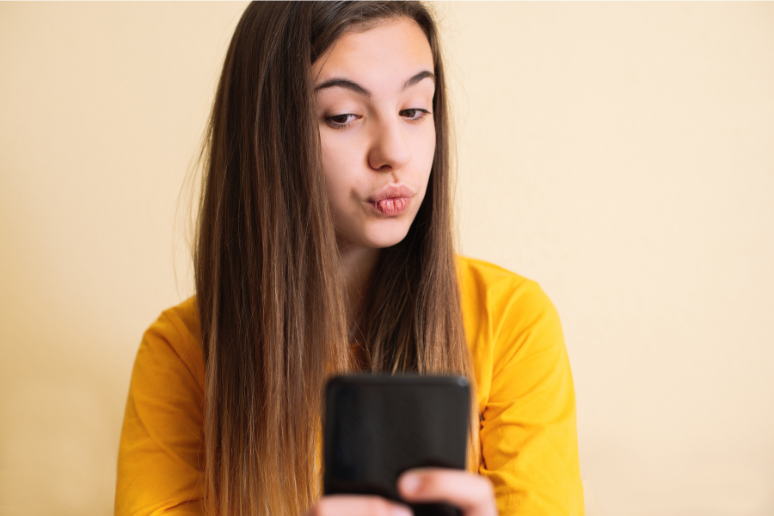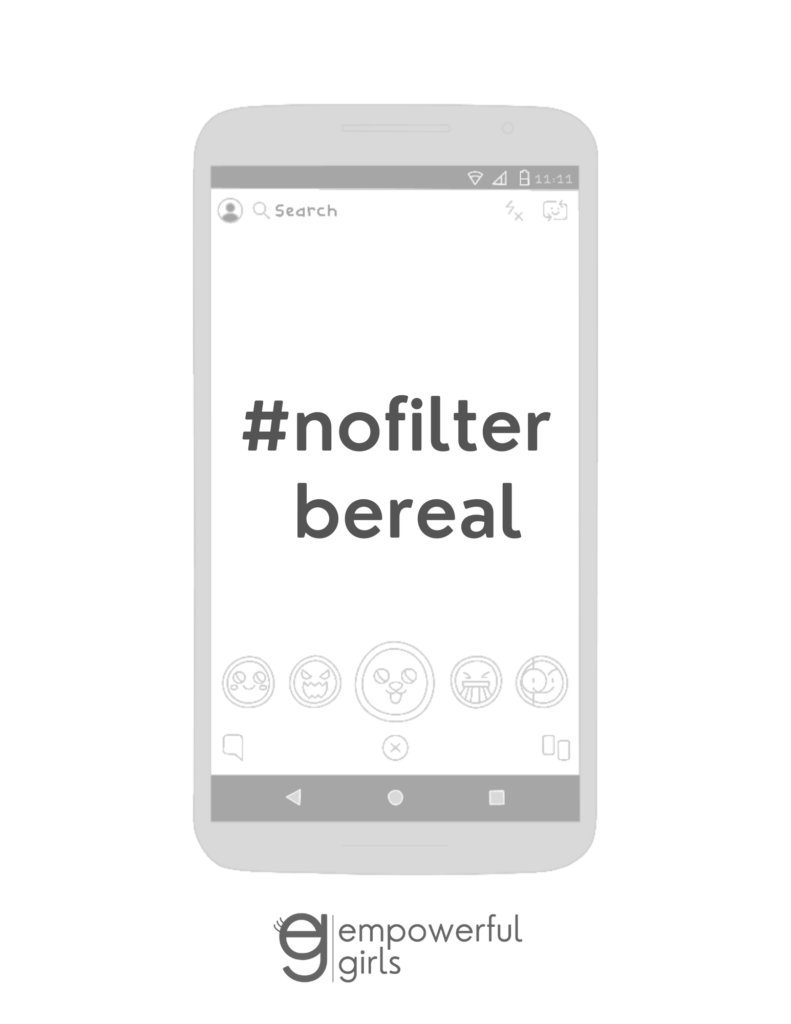
Filters = Fake Fun?
Ok who’s used a filter before? I have! When I first got Instagram I liked toggling through filters to make my picture look retro or high contrast. And then when Snapchat came out with face filters, my kids enjoyed making us look like animals or have ginormous cartoon eyes.
Filters aren’t all fun and games though.
If you’ve ever looked at your real self on a phone then added a filter, did you like that filtered you better? But then when you saw yourself unfiltered again, did you like that real you less? If you answered yes to both, that’s ok, me too. If no, or if you haven’t used filters or social media, this episode is still important info for you. We’re gonna come back to what’s wrong with filters, first let’s get curious and talk about what technology led to filters.
History of Filters
People have been editing pictures since photography was invented, but before computers, editing methods were limited and complicated. The first computer program that could edit pictures was invented in 1988 by two brothers, Thomas and John Knoll. They teamed up with Adobe and released their program as Photoshop in 1990. The first version offered editing tools to smudge, blur, sharpen, stretch, skew, and transform an image. It changed everything.
Around the same time Photoshop came out, digital cameras hit the market. Through the 90s the internet grew and online communities and chat rooms gained popularity. The first camera phone was released in 2000, but it was still an old school cell phone and could only take 20 pictures.
Internet technology advanced into the early 2000s, like blogs and personal profile websites, and in 2004 Facebook launched. Digital cameras and camera phones improved and became even more affordable, so more people bought them, and sharing photos with others got easier.
In 2007 Apple released their first iPhone, a smartphone with a built-in digital camera. In 2010 the iPhone 4 featured a front-facing camera, and selfies took off.
Also in 2010, Instagram came out, and it included photo filter options that would automatically adjust lighting and color. Then photo editing apps became popular because people could edit their appearance like professional photographers could with Photoshop, but these apps were cheaper, easier, and faster to use. So now “photoshopped” photos were all over social media.
In 2011 Snapchat launched, and in 2015 they released “lenses” aka filters using face detection and AR – augmented reality technology. Their first set of filters were more for fun, like dog ears and heart eyes, but they also developed “beauty filters” which made “photoshopped” edits instantly. Facebook/Instagram released their own version of filters two years later, and now we’re about caught up to the present!
So what’s wrong with filters?
Filters are AR, augmented reality, meaning an enhanced version of what’s real. And while Photoshop edits take hours to do, filters can do the same edits instantly: remove “blemishes” like pimples, moles, and scars; erase wrinkles, skin folds, and cellulite; darken or lighten skin tone, volumize hair and eyelashes, stretch certain areas, shrink some body parts and enlarge others. Instantly. And have you noticed that filters make people look eerily similar: big eyes, small nose, plump lips, high cheekbones, lashes for days, glowing skin. Filters and Photoshop edits uphold impossible standards of beauty. It’s toxic perfection, unrealistic and unreachable. Yet girls still feel pressured and expected to live up to these impossible beauty standards, to look like “her” if not in real life, with a filter.
Filters don’t just change how we look, though, they change how we see ourselves and others around us.
The more we see filters on other people, it reprograms our brains into thinking that’s how people are supposed to look, those impossible beauty standards. And when you don’t look like that, but you think everyone else does because you see it all over social media, you feel pretty bad about how you look.
Multiple studies have shown that social media filters lower self-esteem and increase body dysmorphia, which is when people obsess about what they think is wrong with how they look. Some girls are so affected by body dysmorphia that they stop hanging out with friends, and others go to extremes with diets, exercise, cosmetic procedures, or even surgery to make themselves look like a filter.
And social media companies know – they’re aware of its effects.
A Wall Street Journal report from September 2021 said, “Facebook knows Instagram is toxic to teen girls.” Facebook, which owns Instagram, did their own study and found that “thirty-two percent of teen girls (I think that number is way higher) said that when they felt bad about their bodies, Instagram made them feel worse.”
And social media companies don’t seem to care!
They just want to keep people on their app longer so they can make more money. Here’s how that all works: the app’s algorithm sends a girl content on the For You/Discover page, not just what it thinks she likes but also sponsored posts and targeted ads. Of course, the picture or video in the ad is edited and filtered to look “perfect,” which makes the girl feel bad about how she looks, and she compares her real self to the “perfect”/filtered/not real people in the ads. And then she thinks that with this (whatever) they’re selling, she can be like “her” in the ad. So she buys from that product/brand/influencer, and since they pay the social media company to advertise, now they’ve both made money from making this girl feel bad about herself. And then the algorithm feeds her more content like that, she stays on the app longer, they make more money …
Social media companies are counting on you to compare yourself.
When I was a tween/teen (before smartphones and social media), I compared myself to photoshopped pictures of celebrities and models in magazines, but I could turn the page, throw it away, and move on. Today, however, it’s not just famous people; everyone you see is filtered. And you can’t escape it – you carry it with you everywhere, you can access it anytime on a smartphone. You are constantly bombarded by filtered pictures and videos, and even though they’re not real, you know AR, you still compare yourself and feel like your real self isn’t good enough so you feel bad. And when you can’t beat ‘em, join ‘em, right? You use a filter, too, because for a moment it makes you feel better. Until you see your real self again, and then you feel worse. So now you only post with a filter because you think you can’t show your real self.
And now you’re not just comparing yourself to other people filtered.
You’re also comparing yourself to your filtered self that doesn’t even exist.
That’s messed up. That’s not right. It’s not even real. It’s literally augmented reality; manipulated, distorted, artificial, fake.
It’s not real.
Girls, the real you is enough. You can show your actual “nofilter” self. You can be your authentic, unique, genuine, unedited, real you. When you embrace yourself, as you are, you can live more fully, instead of holding back or sitting out. You can go do things and experience joy! You don’t have to change a single thing about you. You are already worthy. Show yourself and be yourself.
The real you is enough.
Let’s start a new trend. Stop using filters. And tell your friends. #NoFilterBeReal
#nofilterbereal Poster Printable
To help you with this, I created a “#nofilterbereal” poster for you to print out, personalize, and post on your wall where you’ll see it, remember it, practice it, and believe it — that’s the important part.
Resources
The best resource I know of is Beauty Redefined. Drs. Lindsay and Lexie Kite are experts in media literacy and body image resilience. I highly recommend you ask your mom or a woman you trust to get their book More than a Body and read it with you. Also their website MoreThanABody.org is loaded with helpful information, and you should follow them on social media @beautyredefined.
More than a Body by Drs. Lindsay and Lexie Kite
If you have a topic suggestion, I’d love to hear from you! Send an email (tweens get the OK from your parents) to hello@EmpowerfulGirls.com .
If you have social media already, follow me on Insta or tiktok @empowerfulgirls. I’m not encouraging or endorsing social media, but I’m on there to offer an unfiltered, uplifting alternative to what’s in your feed. Remember to get on the email list for the newsletter!
Also, if you enjoy listening to 10 for Teens + Tweens, I would truly appreciate you telling your friends about this podcast or leaving a review so others can find it and feel uplifted, too! Your support means the world to me!
